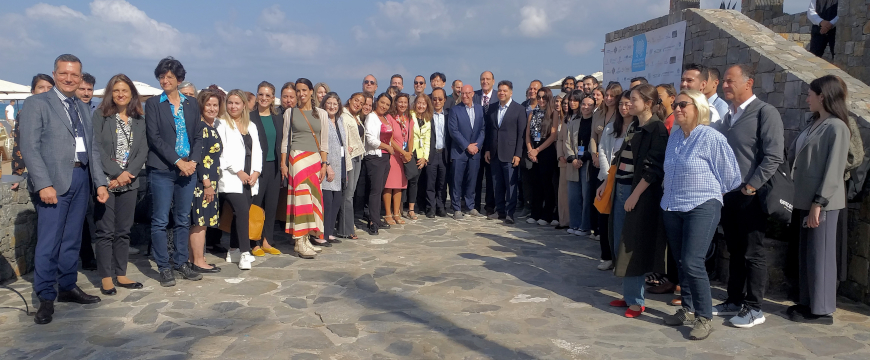Focused on the Mediterranean Tradition and its Modern Applications, the 3rd Cretan Lifestyle Conference gathered more than 75 researchers, students, and professionals from 12 countries and six continents to examine the health benefits of a traditional Greek diet and lifestyle. This multi-generational experiential event connected individuals aged 20 to 89.
From October 29 to November 2, scientific presentations at Amirandes Resort, a Grecotel property near Heraklion, Crete, were complemented by conversations, meals, and outings. The conference was co-organized by the Hellenic Center for Excellence in Health & Wellness and Grecotel under the aegis of the Region of Crete and the Hellenic Republic’s Ministries of Tourism and Health.
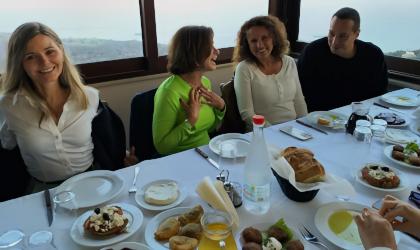
The 3rd edition of this conference opened with a keynote address by Dr. Antonia Trichopoulou, “the mother of the Mediterranean diet” and one of the creators of the first Mediterranean diet pyramid. Lamenting the reduced adherence to this traditional diet in Greece since 1950, she described a new effort to transfer beneficial aspects of the Med diet to other parts of the world in adaptations that fit local cultures and reflect food availability and environmental sustainability: a Planeterranean or Planetary diet.
Other distinguished professors shared insights about a healthy “green” version of the Med diet that includes green tea and the protein-rich plant mankai (Dr. Iris Shai, Israel), and reasons for the beneficial effects of a traditional Greek diet on the biology of aging (Dr. Nektarios Tavernarakis, Greece). Conference organizers Dr. Stefanos Kales of Harvard University and Mr. Demetrios Kalaitzidakis of Grecotel then introduced Mr. Pavlos Antonakis (age 89) as “a living example of healthy aging, the Cretan way” who still does his own gardening in a Cretan village. “Once I reach 100,” he said, “I will decide whether or not to get old.”
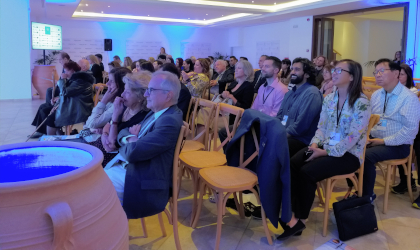
The second day’s main keynote speech was presented by Dr. Frank Hu, Professor and Chair of Nutrition at the Harvard T.H. Chan School of Public Health, who discussed evidence that olive oil is an extremely important component of the Mediterranean diet and lifestyle that contributes a great deal to their health benefits. He also pointed out that olive oil is unique in its anti-inflammatory polyphenol content, eco-friendliness, and cultural and historical significance as compared to other plant-derived oils.
Chef and author Diane Kochilas then shared her personal experiences from the Greek island of Ikaria, which has become famous as one of the world’s “Blue Zones” where many people live unusually long, healthy lives. Other presentations offered evidence that high adherence to the traditional Mediterranean diet correlates with a much lower incidence of cardiovascular disease, type 2 diabetes, and hypertension. Since study results indicated a lower adherence to this diet in Greece today, there was a discussion of how to promote the Med diet as a sustainable lifestyle choice, with nutritional education of parents, children, physicians, and medical students essential, in addition to school lunch interventions.
The final morning of the conference began with an impromptu address by Mr. George J. Tsunis, U.S. Ambassador to the Hellenic Republic, who described his own journey to a trimmer, fitter Greek lifestyle and urged conference participants to help others become healthier.
The last few hours of the scientific program contained updates on what recent research shows about the value of the Mediterranean diet in comparison to other diets, other significant points about the Mediterranean lifestyle, and the results of the Spanish CORDIOPREV study.
CORDIOPREV showed that the Mediterranean diet can prevent one quarter of recurrent major cardiovascular events in coronary heart disease patients, making it far superior to a low-fat diet. Other evidence from more than 12 million people associated greater adherence to the Mediterranean diet with a reduction of risk of chronic disease and overall mortality more generally.
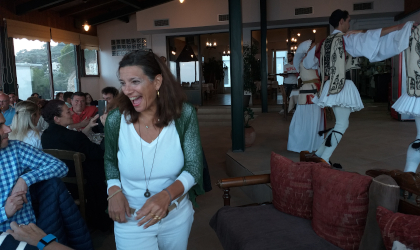
However, benefits come from more than food: there has been a shift in nutritional epidemiology from dietary patterns to lifestyle. Not only is it difficult to isolate the effect of one food, such as extra virgin olive oil, in a larger dietary pattern such as the Med diet; the whole lifestyle pattern, including exercise, socializing, and adequate sleep, appears to contribute to health and longevity.
Finally, participants heard brief presentations on the top five papers in the conference’s 3rd annual Young Professionals’/Investigators’ Competition. Maria del Carmen Aznar de la Riera, a PhD student at the Autonomous University of Madrid, was declared the winner. All 23 young investigators received special student rates for conference attendance, while some received full scholarships.
Before the conference began, a parallel event that focused on the entrepreneurial achievements of young Greek businesspeople highlighted the five finalists in an Agro-Food Startup Company Competition. Young entrepreneurs briefly presented their companies to a panel of judges who evaluated their products and services. While all the finalists will be mentored by experienced professionals, Teapsule won first prize for compostable organic Cretan herbal tea capsules that are compatible with Nespresso machines.
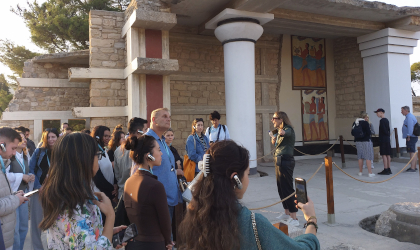
Every afternoon, conference participants explored the Cretan lifestyle, culture, and history with a bus excursion to a different part of Crete, which has been awarded the designation of European Region of Gastronomy for 2026. With Heraklion also one of UNESCO’s Creative Cities of Gastronomy, the first field trip featured a tour and tasting at Haralambakis Winery in the Heraklion area, followed by guided tours of the archaeological site of Knossos and the unique collection of the Heraklion Archaeological Museum.
On Thursday, participants enjoyed a fantastic view of the sea and the city along with a traditional Cretan feast at a taverna where they joined the costumed islanders in spirited folk dances. Friday took the group farther east to the Agios Nikolaos area to learn about the island of Spinalonga, once a leper colony and later the subject of a bestselling novel, and then into the hills among the olive groves, to the picturesque 16th century Monastery of Areti.
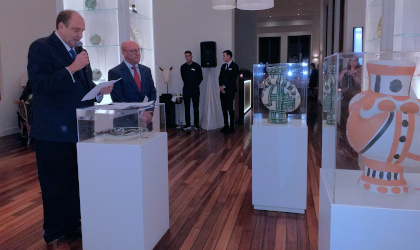
At the sumptuous inaugural dinner and at the gala dinner in Minotaur Restaurant, with its unique collection of original Picasso ceramics, five awards were presented by the Hellenic Center for Excellence in Health & Wellness:
• the Lifetime Award in Tourism to Mr. Michalis Vlatakis, President of Travel Agents of Crete and Vice President of the Panhellenic Federation of Tourist Enterprises
• the Scientific Innovation & Achievement Award to Dr. Nektarios Tavernarakis, distinguished Professor of Molecular Systems Biology at the Medical School of the University of Crete, Chairman of the Board of Directors at the Foundation for Research and Technology-Hellas (FORTH), and Vice President of the European Research Council
• the Ancel Keys Award to Mr. Pavlos Antonakis and Mrs. Irene Antonakis (ages 89 and 78), examples of healthy aging based on Cretan traditions as they continue their active life of gardening in a Cretan village after years of hard work, business success, and contributions to the Greek diaspora community in South Africa
• the Lifetime Achievement Award in Public Health to Professor Frank Hu, MD, PhD, Chair of the Department of Nutrition at Harvard T.H. Chan School of Public Health; Professor of Medicine and Co-director of the Program in Obesity Epidemiology and Prevention at Harvard Medical School; Director of Boston Nutrition and Obesity Research Center Epidemiology and Genetics Core; much-cited author of more than 1400 peer-reviewed papers; and member of the National Academy of Medicine
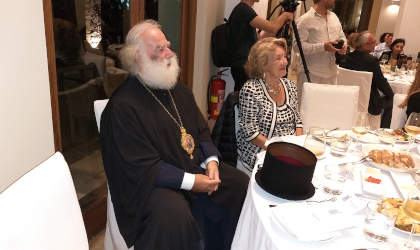
• the Lifetime Award in Philanthropy to His Beatitude Theodoros II, Pope and Patriarch of Alexandria and All Africa, who was born in Crete and has been working in Africa since the 1990s, where he was involved in international interfaith and theological assemblies and the building of churches, schools and clinics; he received a Certificate of Recognition from the UN that recognizes the efforts of the Patriarchate in protecting the environment and addressing problems caused by climate change
Following the suggestion of His Beatitude, the Hellenic Center of Excellence will aim to offer scholarships to enable young scientists from Africa to attend next year’s Cretan Lifestyle Conference alongside local university students, other young entrepreneurs and investigators, and experienced experts.
Greek Liquid Gold editor Lisa Radinovsky received complimentary food, lodging, conference registration, and excursions, and was paid to cover the Cretan Lifestyle Conference as a photojournalist.
All businesses, organizations, and competitions involved with Greek olive oil, the Mediterranean diet, and/or agrotourism or food tourism in Greece, as well as others interested in supporting Greeks working in these sectors, are invited to consider the advertising opportunities on the Greek Liquid Gold: Authentic Extra Virgin Olive Oil website. The only wide-ranging English-language site focused on news and information from the Greek olive oil world, it has helped companies reach consumers in more than 220 countries around the globe.


